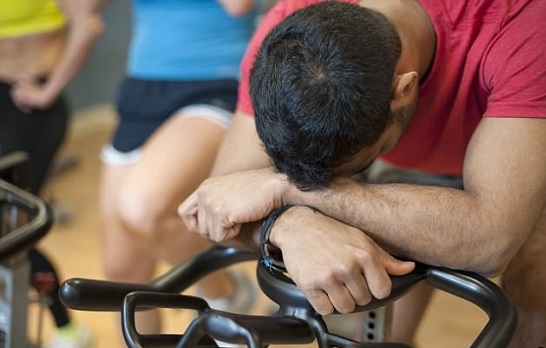While some people come out of the gym with a huge grin on their face, others find absolutely no pleasure in exercising.
Now, a new study has revealed that our enjoyment of exercising is largely genetic.
The researchers hope the findings could be used to develop personalised exercise programmes for people who are not genetically inclined to enjoy the gym according to Daily mail.
Researchers looked at why some people find exercise unpleasant and unrewarding, while others feel a sense of self satisfaction.
The team calls this difference the ‘affective response to exercise’ and suggest that it is to a significant degree genetically inherited.
Their study involved 115 pairs of identical twins who share the same genes, 111 pairs of non-identical siblings share roughly half their genes, 35 of their non-twin siblings, and another six non-twin sibling pairs.
Each participant completed a 20 minute non-vigorous cycle on an exercise bike, as well as a 20 minute treadmill run.
There were also warm up and warm down periods and there was a second brief exercise ride to exhaustion.
While exercising, the participants rated how they felt on a scale of very bad to very good, and how much they felt they were exerting themselves.
From these results, the researchers established the participants’ affective response to exercise.
Then, by comparing the affective response to exercise in identical and non-identical twins, the researchers could work out how much it is inherited genetically.
Results showed that the affective response to exercise was significantly heritable.
During the moderate cycle, heritability was 15 per cent, while on the treadmill it was 35 per cent.
The affective response to exercise also correlated with how much exercise the participants normally did – those who found exercise more pleasant engaged in more exercise.
While the results are promising, the researchers highlight that a causal direction hasn’t yet been established, and it could be that doing more exercise changes how we experience it – regardless of our genes.
The team is also yet to pinpoint the specific genes that dictate whether or not we enjoy exercise.
Ms Nienke Schutte, lead author of the study, said: ‘Establishing the heritability is the first step in genetic studies.
‘Finding the actual genes is the next.’
However, the researchers believe that their findings could be used to help people take up more exercise.
Ms Schutte added: ‘This studies shows that a one-size-fits-all approach to get people to exercise might not work so well.
‘People who are genetically wired to not enjoy exercise will benefit from more personalized exercise programmes in which the negative feelings get reduced as much as possible.
‘Different genes may require entirely different exercise programs!’
N.H.Kh

